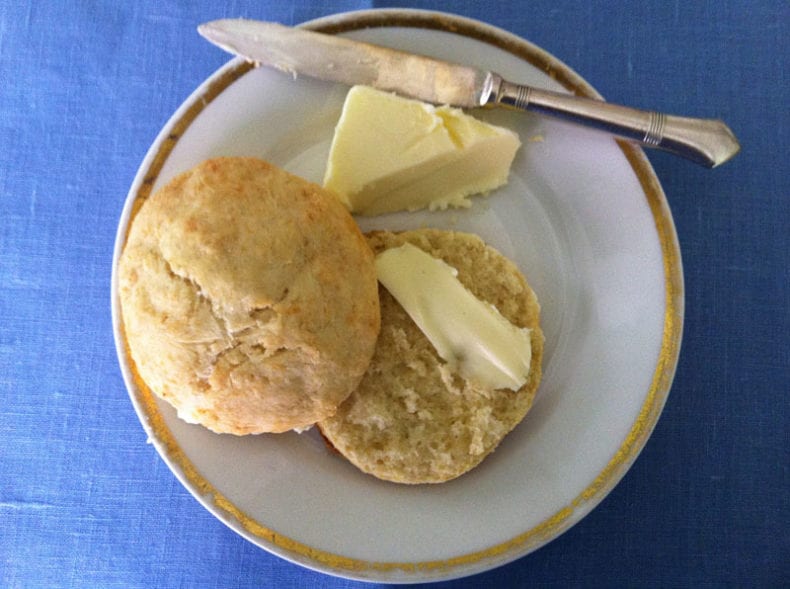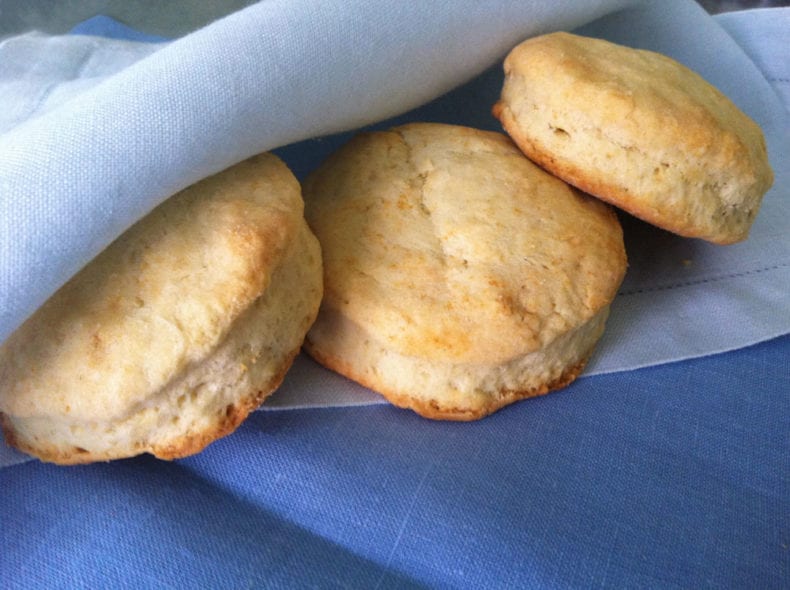When I hear the word “radical” used in the context of personal change —whether a book, a course, a workshop — I generally pass it by. It’s so overused and overblown, I’ve come to mistrust it. But in the past few months, I’d heard a number of smart, curious, level-headed people mention Tara Brach’s book, Radical Acceptance: Embracing Your Life With the Heart of a Buddha. So I ordered a copy from the library. And then I bought a copy for myself. Among the trove of very wise and helpful ideas, I especially love this passage about saying yes, perfection, self-comparison and….biscuits:

Our practice of saying yes is not limited to our immediate experience. We can say yes to the whole life we are living. Yes to our friendships, to our parenting, to our physical appearance, to our personality, to our work, to our spiritual path.
However, because we are usually shooting for perfection, when we step back to take a look at “how we’re doing,” we often feel as if our life isn’t turning out quite right. Mara* appears, casting a shadow over the goodness and value of how we live.
Zen teacher Ed Brown is a brilliant cook and founder of the Greens Restaurant in San Francisco, famous for its natural foods cuisine. But during Ed’s early days as a cook at the Tassajara mountain retreat center, he had a problem. No matter what recipes or variations in ingredients he tried, he couldn’t get his biscuits to come out right. His unreachable standard, as he discovered, was set years earlier—growing up he had “made” and loved Pillsbury biscuits. Finally one day came a shifting-into-place, an awakening: not “right” compared to what? Oh, my word, I’d been trying to make canned Pillsbury biscuits! Then came an exquisite moment of actually tasting my biscuits without comparing them to some (previously hidden) standard. They were wheaty, flaky, buttery, “sunny, earthy, real” (as Rilke’s sonnet proclaims). They were incomparably alive, present, vibrant—in fact much more satisfying than any memory.
These occasions can be so stunning, so liberating, these moments when you realize your life is just fine as it is, thank you. Only the insidious comparison to a beautifully prepared, beautifully packaged product made it seem insufficient. Trying to produce a biscuit—a life—with no dirty bowls, no messy feelings, no depression, no anger was so frustrating. Then savoring, actually tasting the present moment of experience—how much more complex and multifaceted. How unfathomable.

In honor of Brown, I offer this lovely biscuit recipe that a former assistant gave me years ago, after we scarfed down the warm biscuits she brought to work. After she had tried and failed making classic butter-based biscuits, she found this super simple way of making rich airy biscuits with a slight crunch outside. (They are adapted from the great James Beard by Smitten Kitchen.)

Recipe: Cream Biscuits
3 Minutes to Assemble, 12 to Bake; Adapted from James Beard’s American Cookery
The original recipe has you brush your baking sheet with melted butter (and increases the amount by two tablespoons) but for whatever reason, the butter not covered by biscuits just got smoky in my oven so I’m voting for you to just line your sheets with parchment. If you find dipping the biscuits in butter difficult (hard to grasp if the dough is soft), just brush them generously instead.
Made about 10 biscuits, perhaps a dozen if I had been stricter about the height and scrap-usage
3 tablespoons melted butter
2 cups all-purpose flour, plus more for dusting the surface
1 tablespoon baking powder
1/2 teaspoon salt
1 tablespoon sugar (optional)
1 1/2 cups heavy cream
Preheat the oven to 425°F. Line a baking sheet with parchment paper. Melt butter in a small pot or microwave dish, and set aside. Sift two cups flour, the baking powder, salt and (if using) sugar into a large bowl. Fold in 1 1/4 cups cream. If the dough is not soft or easily handled, fold in the remaining 1/4 cup cream, little by little. (I ended up using two additional tablespoons, or half the unused cream.)
Turn dough onto a floured surface, mound it into a ball and, using your hands, press it to a thickness of about 3/4 inch. Cut into rounds, 2 1/2 inches in diameter. Gather dough scraps and continue to make rounds. Dip the top of each round in melted butter and arrange on the baking sheet. Bake until golden, 12 to 15 minutes. Serve immediately, or flash freeze for future use. [Biscuits can be baked straight from the freezer, and additional few minutes baking time will be needed, usually around 3 to 5.]

Related Posts
*In Buddhist cosmology, Mara represents thinking or worldview that causes interference to constructive and harmonious living. Here’s is how Thich Nhat Hanh explains it.





Tara Brach popularized the concept of radical acceptance in her first book of that name, but never gave credit to the great Marsha Linehan, the founder of Dialectical Behavioral Therapy. I hope Ms. Brach corrected that oversight in the book you mention.
Hello Chris, Thanks for your comment which has sparked many questions.
I don’t see mention of Marsha Linehan in my new edition of Radical Acceptance that was original published in 2003. Nor any mention when I googled the two in the same query. Do we know for certain that Brach did in fact use Linehan’s work as a springboard, as obvious as it might seem? If that is the case, it is disappointing to say the least.
A friend who as a psychotherapist has supervised therapists over several decades said that he is surprised at how many have not known of Linehan’s groundbreaking work, and thought that could have been true of Tara Brach at the time she wrote Radial Acceptance. He employs some of Linehan’s techniques and thinking in his own work. He does not view Brach as a therapist, but as a meditation teacher.
In my career as chef and cookbook writer, I was amazed at how I could come up with an idea I was sure was totally original, only to find a cook on the other side of the country doing the same, or had done years early. And I can’t tell you the times I’ve seen someone publish a recipe or concept that seemed too close to one I had come up with, even using the same words. Did they take my work for their own, or were the expressing something that had become part of the culture, or inadvertently of their own thinking?
Since your comment sent me on a deep dive of Linehan’s work, I’m finding it and her story extremely powerful, heartening, and in many ways transformative. (I plan to do a post about it).